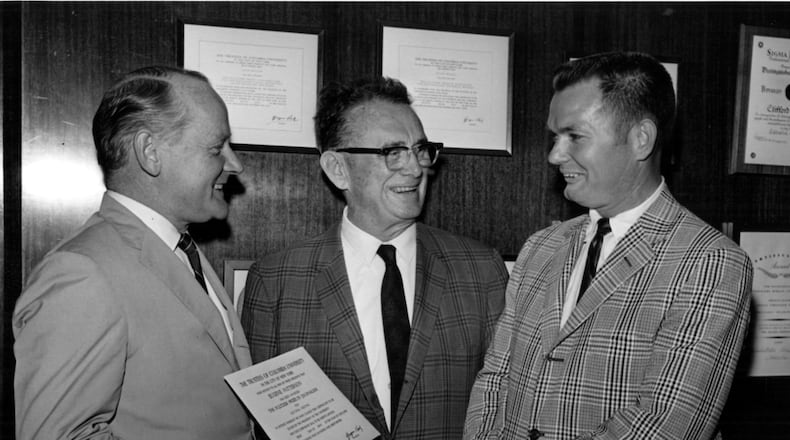A reading, discussion and signing of "Scoop: The Evolution of a Southern Reporter," a memoir by the late Jack Nelson, featuring former President Jimmy Carter, former United Nations Ambassador Andrew Young, editor Barbara Matusow Nelson and Terry Adamson, will take place at 7 p.m., Wednesday, Jan. 16, at the Carter Presidential Library and Museum Theater, 441 Freedom Parkway, Atlanta; free and open to the public. Information: 404-865-7100; www.jimmycarterlibrary.gov/ (Note: President Carter will not be signing books.)
As a teenager in Mississippi, Jack Nelson was a hard-nosed Golden Gloves boxer.
Nelson brought that attitude to the newsroom, becoming one of country’s most celebrated investigative reporters. His career earned him a Pulitzer Prize in 1960 for investigating Georgia’s brutal state mental hospital for The Atlanta Constitution, and brought the wrath of countless racists, murderers and corrupt politicians who did not welcome his attention.
Nelson summed up that career in a memoir, left unfinished at the time of his death in 2009, but completed by his widow Barbara Matusow.
Matusow will speak about “Scoop: The Evolution of Southern Reporter,” in a program Wednesday at the Carter Center, where she will be joined by, among others, former President Jimmy Carter.
Terry Adamson, spokesman for the U.S. Justice Department during the Carter administration, and a longtime Nelson confidant, will also speak.
Adamson said Nelson’s stellar ethical grounding was one of his great assets.
“One of the many things that has impressed me is the standard (Nelson) set for integrity and the value of transparency that is the heart of the journalistic role,” said Adamson. “He lived it throughout his extraordinarily productive life, and it is a remarkable testament that journalists in legacy and new media today aspire to it now.”
Born in Alabama, Nelson moved to Mississippi as a teenager, and wrote for the Biloxi Daily Herald while he was still in high school. Coincidentally, former AJC editor Hank Klibanoff got his start at the same paper.
In “The Race Beat,” Eugene Roberts’ and Klibanoff’s Pulitzer-winning account of the news business during the Civil Rights era, the authors called Nelson “the most source-connected reporter in the South since Claude Sitton [of the New York Times].”
Klibanoff wrote the introduction to Nelson’s memoir, and will also speak at Wednesday’s program.
“What may be in shorter supply now, with the loss of Jack,” Klibanoff said, “was someone who always stood for the first amendment.”
Nelson arrived at the Constitution in the early ’50s.
Bill Shipp, former political editor at the Constitution, was a cub reporter when Nelson won his Pulitzer for exposing barbaric conditions at the state mental hospital in Milledgeville, and he held Nelson in great esteem.
“He had by far the greatest sense of right and wrong of any reporter I’ve ever seen, and the greatest sense of outrage,” Shipp said.
Nelson was a generous mentor, taking Shipp along while covering the 1964 killing of Lemuel Penn, who was murdered by the Ku Klux Klan near Athens. Nelson encouraged Shipp to write a book about the incident.
Later Nelson ran the Atlanta-based Southern bureau for the Los Angeles Times, and then the L.A. Times’ Washington bureau, where he broke significant stories in the Watergate saga.
Said Shipp, “Newspapers today would be in better shape if they had more people like Nelson.”
About the Author
The Latest
Featured



